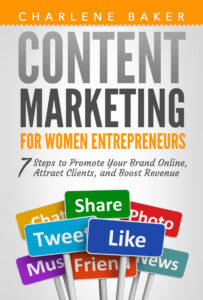Search engine optimization…also known as SEO.
Sure you’ve heard the term, but what exactly is it?
And why is it so important for entrepreneurs to have some level of understanding of how SEO works?
Because SEO is how people find you on the web–particularly through search.
In fact, SEO is important if one of the following applies to you:
- You have your own website
- Plan to use search engines like Pinterest or YouTube for your marketing
- You’re a content writer and desire to better serve your people with amazing, optimized content that attracts and drives results over time
- Want to use blogging as a long-term strategy to drive thousands of visitors to your website
TBH, understanding SEO is also key for your social media strategy as well. For Instagram, it’s hashtags. For Facebook, is keyword phrases that users would likely use when searching for related content.
When you know SEO, how it works, and why it’s important, you can transfer that to your entire digital marketing strategy, regardless of the platform you’re on.
The aim here is to make this an easy, non-technical reference that gives you a good knowledge of SEO, how to implement it in your content strategy, and the tools to use.
Here goes!
What Is Search Engine Optimization–SEO?

I love Search Engine Land’s easy definition of SEO:
“In simple terms, it means the process of improving your site to increase its visibility for relevant searches. The better visibility your pages have in search results, the more likely you are to garner attention and attract prospective and existing customers to your business.”
So, in other words, SEO are the steps you take to enhance your website and content so it shows up in search results.
How do you do this?
By using keyword phrases your audience is actively searching for and ensuring those keywords are naturally included in your actual content–whether on your web pages, title tag and meta description, or blog posts.It’s an organic approach to promoting your content.
Because it’s organic though, it takes time to build some juice.
Or, as my baby boomers would say, “you’ve gotta put a little elbow grease in it.”
SEO is a marathon. However, when done consistently, it can yield some AH-MAZ-ING results!
Okay, So What’s Search Engine Marketing–SEM?
Quick note: There’s also SEM or search engine marketing. I won’t go into detail because SEM is not my sweet spot but it’s worth mentioning.
The biggest difference between the two is search engine marketing involves using similar SEO techniques but also leveraging paid advertising.
This involves Google Ads or PPC, or pay per click. You’re paying Google to get your stuff shown at the top of search results.
PPC is a more expensive form of advertising. I would advise consulting a specialist if you’re new to this type of marketing yet desire to get your company more Google presence.
Here are also a few reputable sources on the subject if you want to go deep:
- A Beginner’s Guide to Using Google Ad (Previously Google Adwords)
- How to Use Google Ads (A Crash Course)
- The Ultimate Guide to Google Ads [Examples]
How does SEO work?
No one knows the exact formula behind Google’s algorithms, and search engines are constantly changing it to keep us marketers on our toes.
However, being in the game long enough, there are some tried and true methods that will always work.
These tactics are authentic and meaningful because it keeps the user experience/the reader/the audience top of mind.

The following are a few best practices that always win with SEO regardless of algorithm changes:
Focus on your people’s (the searcher) intent
Keep in mind the reason why someone is searching for the answer to the question and/or problem you plan to solve in your content. What are they trying to accomplish?
There’s a bit of psychological work behind this but if you can get into the thoughts of your people, it’ll make your content highly effective.
Create a great reader experience
It’s hard to consume bulky paragraphs on mobile devices, which is where most people are accessing the internet these days. By using subheadings, clean formatting, and shorter paragraphs, it’s easier for your reader to digest your message.
Also, multimedia pieces like videos and gifs along with images goes a long way in keeping it engaging.
The longer, the better
Long-form content simply performs better. Not only does it provide more opportunity to naturally sprinkle your keywords throughout your piece, it gives you a chance to dive deep into the topic, covering different angles and providing amazing value.
Content around 800+ words does well for Pinterest. If your long-term strategy is Google ranking, then 2,000+ words is your goal.
Use your suggested keyword phrases…but don’t keyword stuff!
Keyword stuffing is just that: overusing keyword phrases in an attempt to manipulate the search engine’s algorithm. It doesn’t work. Not in this lifetime. It also doesn’t create a great user experience.
As Toni Braxton said, let it flow. Simply allow the keywords to be a natural part of your conversation. Do include them in your title, a subheading, in your introduction, and a few more times in your piece.
Let it flow!
What Tools Can I Use for SEO?
So, how do you find ideal keywords your audience is searching for? How do you know what’s performing well, what’s too competitive, and what’s low-hanging fruit?
You can leverage the following free tools (yup, I said free) to start documenting keywords that align with your niche and what your people are asking.
Google Autocomplete – As you start typing in a keyword in Google’s search and then other suggestions come up, pay attention to those. Google is letting you know what people are typing in. You can also scroll to the very bottom of that search page and see more suggestions. Here’s an example for the keyword phrase “content marketing”

Yoast – Perhaps one of the more popular WordPress plugins, Yoast is a free tool that guides you in better optimizing your website for SEO and reader experience. Super easy to use!
Ubersuggest – I love the simplicity behind this tool. It gives you ideas around other keywords that are working in your industry and their competitiveness. Thing is, you only get three free searches a day but there is a paid option if you’re on a roll.
Google’s People Also Ask – You know that small section that provides related questions around the keyword you’ve just searched for–as illustrated below using the same “content marketing” keyword example? It’s golden! Take heed and see how you can work some of those questions in your content and topic ideas.

Pinterest and YouTube’s Autocomplete – The same concept as Google autocomplete. The keywords gathered, of course, may work better on those platforms but it still gives you some ideas to work with.
Finally, there are more robust options that come with paid subscriptions. These include Moz, SEMRush, and Ahrefs to start. Not totally necessary in the beginning as you spread your wings with SEO but certainly to keep in mind as you become more advanced and SEO is a big part of your content strategy.

Where to Start with SEO {Your Quick Action Steps}
With a better understanding of how SEO works, why it’s valuable, and the tools needed to get it done, use this easy framework to get started:
#1 Know Your Keywords
Spend a day or weekend doing some keyword research and document them on a spreadsheet. Also, explore what your competitors are doing by using Ubersuggest to plug in their domain name and seeing what keywords pop up.
#2 Optimize Your Webpages
Once you’ve established your go-to keywords, revisit your existing webpages and start optimizing. Include your keywords in your content and in the title tags and meta descriptions.
If you’ve downloaded Yoast, here’s how to access the title tags and meta descriptions in WordPress:
- Login to your dashboard and choose “Page” in the left-hand navigation
- Choose the page you’re ready to optimize. Click “Edit”
- Scroll down to the bottom until you see Yoast SEO
- Complete the Focus Keyword, SEO Title, Slug, and Meta Description fields
Do this for all of your pages! You can follow this same process for your blog posts as well.
#3 Align Your Content Topics around Your Keywords
Use your keyword research to build your content calendar for the next 30 or 90 days. Here’s a phenomenal resource for crafting great headlines that feature your keyword.
You Can Do SEO🥳!
SEO doesn’t have to be a complicated feat. It’s a long-term play but with consistency, you can begin optimizing your content to drive better results for your website, social media content, and YouTube videos.
SEO it up!
Psst: Need help building your content calendar?
👉🏽 Here’s a technique to map out your strategy for the quarter. 👈🏽



